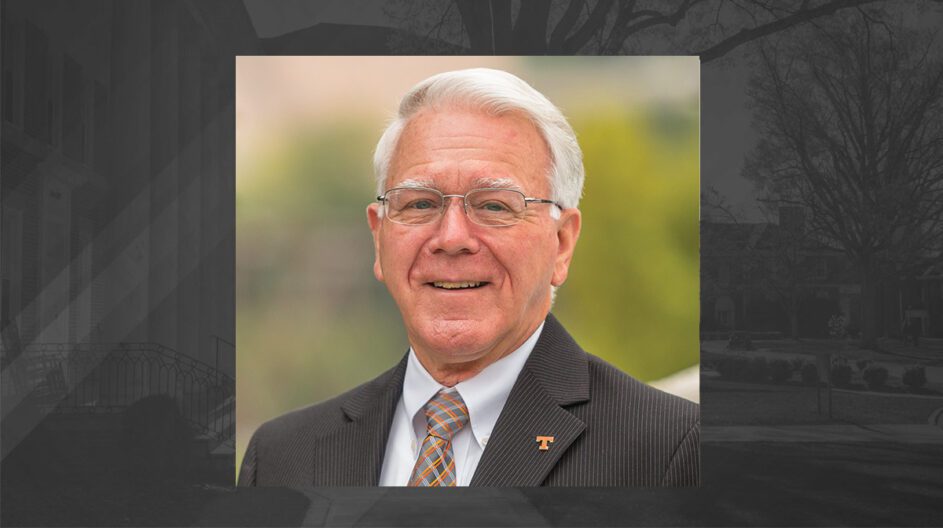
Wayne Davis ’70 Receives Distinguished Alumni Award
Dr. Wayne T. Davis ’70, the recipient of this year’s Pfeiffer University Distinguished Alumni Award, has enjoyed a notable and celebrated career in higher education. He has demonstrated again and again that a graduate of Pfeiffer can absorb the best from its small-is-beautiful culture and apply it successfully on a much larger stage. For Davis, Pfeiffer helped provide the foundation for teaching and leadership positions at the University of Tennessee, Knoxville (UT), where he spent his career.
Davis found extraordinary success at UT as a professor, researcher, and administrator from 1975 until 2019, the year he retired. And he did so while keeping influences of Pfeiffer in the forefront of everything he did: “Even in a large university environment, I was somehow able to retain and pass on the benefits of the small college/university atmosphere I knew at Pfeiffer,” Davis said.
“I was never reluctant to express that my style of teaching and leadership was nurtured at Pfeiffer,” he added, extolling the benefits of having served as the Treasurer and President of the Men’s Student Government Association.
After majoring in physics at Pfeiffer and earning a master’s degree in that subject from Clemson University, in 1971, Davis saw that industries were floundering because of the Environmental Protection Act.
“They didn’t know how to meet the act’s requirements,” he said. “I was ready to help, and I knew I needed an engineering education to make that happen. I felt up to the task since physics is the language of engineering.”
Davis earned two advanced degrees from UT: a Master of Science in environmental engineering (1973) and a doctorate in civil and environmental engineering (1975). He then joined the faculty in the Department of Civil and Environmental Engineering at UT’s Tickle College of Engineering and, before becoming its Dean in 2009, taught numerous graduate students and conducted lots of hands-on research.
When Davis retired from UT, he did so with three emeriti titles next to his name: Chancellor Emeritus, UT Knoxville; Dean Emeritus, Tickle College of Engineering; and Professor Emeritus, Department of Civil and Environmental Engineering.
The chancellorship was an interim appointment, which lasted from 2018 to 2019. As chancellor, Davis “was responsible for guiding a campus with an annual budget of $1.3 billion and an endowment of about $800 million; an enrollment of approximately 29,000 students and a workforce of nearly 12,000 faculty, staff, and students; and a base of more than 250,000 alumni,” Dr. Jimmy G. Cheek, UT’s Chancellor Emeritus, wrote in a letter recommending Davis for the Distinguished Alumni Award.
That Davis was tapped for the chancellorship at UT certainly owes much to his success as the Dean of the Tickle College of Engineering, a post he held beginning in 2008. During his deanship, enrollment of both undergraduate and graduate students increased by 64 percent and 45 percent, respectively. The number of undergraduate and graduate students who received degrees increased by 36 percent.
In research and teaching, the metrics were just as impressive. Research contracts and grants increased by 118 percent, and 42 faculty positions were added. The opening of new buildings more than doubled the size of Tickle College, and $399 million was raised for endowments and cash.
Davis was honored numerous times for his service to UT. He received the Distinguished Alumnus Award; the Nathan W. Dougherty Award, which Tickle College presents to an engineer who has brought honor and distinction to the program; and the Macebearer Award, UT’s highest honor for faculty. He became the inaugural holder of the Wayne T. Davis Endowed Dean’s Chair in Engineering, which is funded with a $3 million endowment.
In his letter of recommendation, Cheek wrote that Davis “is an extremely hard worker, exhibits impeccable integrity and honesty, and is extremely productive.”
Cheek also praised the concern Davis showed for the success and well-being of his students at UT and for valuing faculty-student interactions.
“I believe this resulted from him being a student at Pfeiffer University,” Cheek wrote. “While a student there, he experienced smaller classes and significant interactions with faculty and staff resulting in a career-long commitment to fostering positive faculty-student interaction in the classroom, laboratory, and in various college activities.”
Davis echoed this view, relating a story that would come to have great importance for him, his future, and the way he would operate at UT.
The Hillsborough, N.C. native became interested in attending Pfeiffer because of its “educational quality and intimate feel,” but financial need was a major factor in his college search.
The offer of the Trustee Scholarship persuaded Davis to enroll at Pfeiffer. Although quite generous, the scholarship funded but a third of his tuition each year. He would have to underwrite the balance with money earned from work-study employment in Pfeiffer’s physics labs and by laboring each vacation day except Christmas in electrical construction.
When he arrived on campus at the start of his junior year, he felt he had scraped together enough money to cover his tuition. He was wrong: Unbeknownst to him, the bill had increased by $200 over the summer.
“I was totally devastated,” he said.
Fortunately, the late Dr. Harold Stephenson, who taught Davis’ physics classes at Pfeiffer, had a solution. He took Davis to a nearby bank, where he co-signed a loan for $200, trusting that Davis would be able to pay back the total because of the jobs he would work while at Pfeiffer.
“I remain incredibly grateful to Dr. Stephenson for helping me through a difficult time at Pfeiffer,” Davis said. “This act of generosity and kindness shaped me forever, ensuring that I would complete my studies at Pfeiffer and pursue a career in higher education.”
“Sylvia and I have a lot of fond memories of Pfeiffer,” Davis added, referring to his wife, also a Pfeiffer alumna, who graduated in 1969. “I have a tremendous amount of respect and thankfulness for what Pfeiffer did for both of us.”